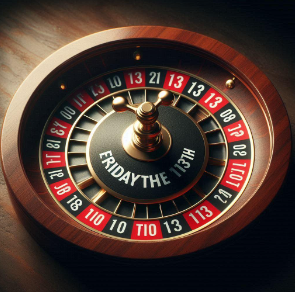Friday the 13th: A Day of Misfortune or Opportunity?
- Julia Heisler
- Jun 26, 2024
- 4 min read
Friday the 13th is a date that evokes contrasting feelings. While some dread this day, fearing unlucky events, others see it as a unique chance, especially in the realm of gambling.
What makes this day so special?
To uncover its mystique, let's delve into the cultural and historical origins of this fascinating superstition.
The Mystical Roots of Friday the 13th
Nordic Myth: The Unfortunate Thirteenth Guest
The origin of the Friday the 13th superstition can be traced back to Nordic mythology. One of the most famous stories is that of the feast of the gods in Valhalla. Loki, the god of mischief, arrived uninvited as the thirteenth guest, disrupting the harmony and causing the death of Balder, the god of light. This incident solidified the association of the number 13 with misfortune.
Simultaneously, Friday itself has long been seen as a day of bad luck. Linked to the goddess Freyja, this day was often considered unlucky in later patriarchal societies.
Religious Roots: The Last Supper of Jesus Christ
One of the oldest associations between Friday and the number 13 is the Last Supper of Jesus Christ with his twelve apostles before his crucifixion, which took place on a Friday. Judas, the betrayer, was the 13th guest, reinforcing the idea that the number 13 is ominous. Jesus Christ was crucified on a Friday, a day now known as Good Friday, associated with suffering and betrayal, thus deepening the belief that Friday is a dark day.
Tragic Historical Events
Friday the 13th has witnessed several tragic events throughout history, reinforcing its reputation as an unlucky day.
The Fall of the Knights Templar
One significant historical event that bolsters the reputation of Friday the 13th as a day of misfortune is the fall of the Knights Templar. On Friday, October 13, 1307, under the orders of Philip IV of France, many members of the order were arrested, accused of heresy and other crimes, tortured, and executed. The last Grand Master of the order, Jacques de Molay, was burned at the stake. Before his death, Molay cursed the King and Pope Clement V, condemning them to die within the year, which indeed happened. This tragic episode has left a lasting mark on the association of Friday the 13th with bad luck.
Modern Catastrophes
Various incidents, such as transportation accidents or tragic events, have occurred on Friday the 13th, fueling the perception of this day as cursed.
One often-cited modern anecdote is the Apollo 13 space mission. The mission launched on April 11, 1970, at 13:13 military time, and the explosion that endangered the crew occurred on April 13. Although the crew eventually survived, these events cemented the association of the number 13 with bad luck.
The Impact on Economy and Buildings
Many businesses and hotels avoid using the number 13 in their room or floor numbering. For example, some buildings lack a 13th floor or a room number 13 to appease the superstitions of clients and residents.
Why is Friday the 13th Lucky for Gambling?
The Belief in the Reversal of Bad Luck
Despite its grim reputation, Friday the 13th is paradoxically considered by some as a day of great fortune, especially in gambling. The theory of the reversal of bad luck suggests that the universe might compensate for the generally unlucky day with moments of exceptional fortune. This idea encourages many to play games on this day, hoping that general misfortune will transform into personal gain.
Irrational Optimism and Player Psychology
Friday the 13th entices people to take risks. The attraction of Friday the 13th for gamblers can also be explained by a psychological phenomenon known as irrational optimism. This day offers an excuse to take risks that would otherwise be deemed imprudent. The idea that bad luck could turn into good luck motivates people to play, despite the low odds of winning. Stories of significant wins on this day further fuel this perception, creating a snowball effect.
The Marketing Impact of Gambling
Lotteries and casinos often exploit the mystery of Friday the 13th to attract players. Special promotions, extraordinary draws, and increased jackpots are strategies used to turn this day of perceived bad luck into an opportunity for fortune.
Remarkable Winning Stories on Friday the 13th
Lottery Winners and Big Wins
In 2013, a French woman won 13 million euros in the lottery on Friday, December 13. Such stories feed the idea that Friday the 13th can be a lucky day, counterbalancing its reputation for misfortune.
Exceptional Casino Wins
Casinos often observe a surge in attendance on Friday the 13th. Some organize special events or offer additional bonuses, attracting even more players and increasing the tales of notable wins on this day.
Conclusion
Friday the 13th is a day rich in superstitions and contradictions. Although it is widely seen as a day of bad luck, it has also become a symbol of opportunity in the world of gambling. Whether through the belief in the reversal of bad luck, irrational optimism, or marketing strategies, Friday the 13th continues to captivate minds, offering both chills and hopes of fortune.





Comments